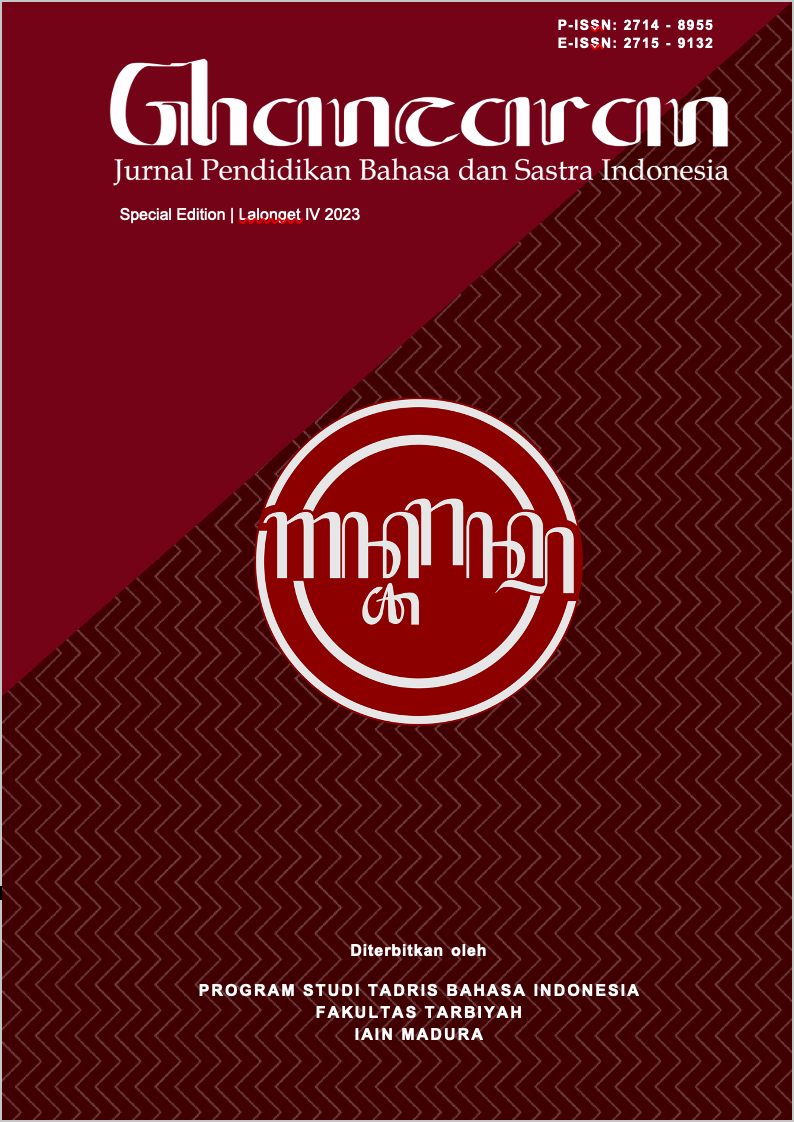Implementasi Model Pembelajaran Inkuiri dalam Menulis Kritis melalui Teknologi Literasi Digital
 Abstract views: 378
,
Abstract views: 378
,
 PDF downloads: 332
PDF downloads: 332
Abstract
This research aims to describe the implementation of the inquiry learning model in critical writing through digital literacy technology. This research is also to determine the implementation of inquiry learning in critical writing by utilizing digital literacy technology. This research method uses research and development methods used in this research. Based on development standards for learning system design, this investigation was carried out procedurally. The procedure includes preparation, implementation and evaluation stages. The data collection in this research was through classroom observations, student and teacher interviews, as well as analysis of student written work produced through digital literacy technology. Data analysis in this research involved collecting, processing and interpreting data from students' literacy activities and written production. Data can be presented in the form of interactions on digital literacy platforms, student responses, or the quality of written results. The results of this research show that the inquiry learning model can be useful in making it easier for students to write critically, supported by the existence of digital literacy technology which has developed rapidly. Digital literacy technologies enable quick and easy access to a wide range of information sources in critical writing contexts.
Downloads
References
Albaburrahim, A., & Rahman, A. (2022). Pengembangan Model Bahan Ajar Pembelajaran Bahasa pada Membaca Efektif Terintegrasi dengan Pendidikan Karakter di Era Merdeka Belajar. GHANCARAN: Jurnal Pendidikan Bahasa Dan Sastra Indonesia, 47–57.
Ambarsari, W. (2012). Penerapan Pembelajaran Inkuiri Terbimbing terhadap Keterampilan Proses Sains Dasar pada Pelajaran Biologi Siswa Kelas VIII SMP Negeri 7 Surakarta.
Barus, M. (2015). Pengaruh Model Pembelajaran Inkuiri terhadap Kemampuan Menulis Teks Cerita Pendek oleh Siswa Kelas VII SMP Negeri 2 Kabanjahe Tahun Pembelajaran 2014/2015. UNIMED.
Djalal, F. (2017). Optimalisasi Pembelajaran melalui Pendekatan, Strategi, dan Model Pembelajaran. SABILARRASYAD: Jurnal Pendidikan Dan Ilmu Kependidikan, 2(1).
Hasanah, H. (2022). Pengaruh Literasi Digital terhadap Peningkatan Keterampilan Berpikir Kritis Peserta Didik pada Mata Pelajaran PPKN (Penelitian Survei pada Peserta Didik Kelas VIII MTsN 2 Kuningan). FKIP UNPAS.
Hermawan, A. (2014). Konsep Belajar dan Pembelajaran Menurut Al-Ghazali. Qathrunâ, 1(01), 84–98.
Khoerunnisa, P., & Aqwal, S. M. (2020). Analisis Model-model Pembelajaran. Fondatia, 4(1), 1–27.
Lestari, I. S. (2012). Peningkatan Motivasi dan Keterampilan Menulis Narasi dengan Metode Peta Pikiran pada Siswa Kelas IV SD Negeri Palur 04 Mojolaban Kabupaten Sukoharjo Tahun pelajaran 2011/2012.
Mardana, F. F., Noer, S. H., & Suharsono, S. (n.d.). Pengembangan LKPD Berbasis Inkuiri Terbimbing untuk Meningkatkan Kemampuan Berpikir Kritis Matematis.
Nurlailah, M. (2022). Analisis Literasi Digital dan Keterampilan Berpikir Kritis Mahasiswa pada Pembelajaran Berbasisi WEB. UIN Raden Intan Lampung.
Nurrita, T. (2018). Pengembangan Media Pembelajaran untuk Meningkatkan Hasil Belajar Siswa. Jurnal Misykat, 3(1), 171–187.
Prasetiyo, M. B., & Rosy, B. (2021). Model Pembelajaran Inkuiri Sebagai Strategi Mengembangkan Kemampuan Berpikir Kritis Siswa. Jurnal Pendidikan Administrasi Perkantoran (JPAP), 9(1), 109–120.
Putikadyanto, A. P. A., Zamahsari, G. K., & Violando, W. A. (2021). Investigating Positive Perceptions of High School Students’ Distance Learning Experiences During a Pandemic. Abjadia, 6(2), 170–181. https://doi.org/10.18860/ABJ.V6I2.13874
Rahman, T. (2018). Aplikasi Model-model Pembelajaran dalam Penelitian Tindakan Kelas. CV. Pilar Nusantara.
Rahmawati, I. Y., & Yulianti, D. B. (2020). Kreativitas Guru dalam Proses Pembelajaran Ditinjau dari Penggunaan Metode Pembelajaran Jarak Jauh di Tengah Wabah COVID-19. Al-Asasiyya: Journal Of Basic Education, 5(1), 27–39.
Rozie, F., & Pratikno, A. S. (2023). Media Pembelajaran Digital dalam Pembelajaran di Sekolah Dasar. Rena Cipta Mandiri.
Rusdi, R., & Lauh, W. D. A. (2022). Pengaruh Pembelajaran Inkuiri serta Strategi Pembelajaran Berbasis Permasalahan terhadap Kemampuan Renang Ditinjau dari Tingkatan Percaya Diri. Jurnal Pendidikan Olah Raga, 11(2), 198–213.
Suhada, H. (2017). Model Pembelajaran Inquiry dan Kemampuan Berpikir Kritis terhadap Keterampilan Proses Sains Siswa Kelas V pada Mata Pelajaran IPA. Jurnal Pendidikan Dasar, 8(2), 13–24.
Syafrial, H. (2023). Literasi Digital. Nas Media Pustaka.
Uno, H. B., & Umar, M. K. (2023). Mengelola kecerdasan dalam pembelajaran: sebuah konsep pembelajaran berbasis kecerdasan. Bumi Aksara.
Zamahsari, G. K., Putikadyanto, A. P. A., & Ansori, R. W. (2021). Ragam Pertanyaan dan Teknik Bertanya Pengajar BIPA dalam Interaksi Pembelajaran di Kelas. Ghancaran: Jurnal Pendidikan Bahasa dan Sastra Indonesia, 2(2), 125.
Copyright (c) 2023 GHANCARAN: Jurnal Pendidikan Bahasa dan Sastra Indonesia

This work is licensed under a Creative Commons Attribution-ShareAlike 4.0 International License.
Ghancaran: Jurnal Pendidikan Bahasa dan Sastra Indonesia uses an Open Access Policy under the Creative Commons Attribution-ShareAlike 4.0 International License. Authors publishing in this journal agree to the following terms:
- Ghancaran Journal holds the copyright and grants the journal rights for first publication with the work simultaneously licensed under a

The work is distributed under Creative Commons Attribution-ShareAlike 4.0 International License which allows others to share, copy, and redistribute the material in any media or format and adapt, remix, change, and develop the material even for commercial purposes, as long as it is stated credit and license derivative works under similar terms. - Authors may make additional contractual arrangements for non-exclusive distribution of the journal's published work version.
- Authors are permitted to post their work online (e.g., in institutional repositories or on their websites) before and during submission, as doing so may lead to productive exchange.



















